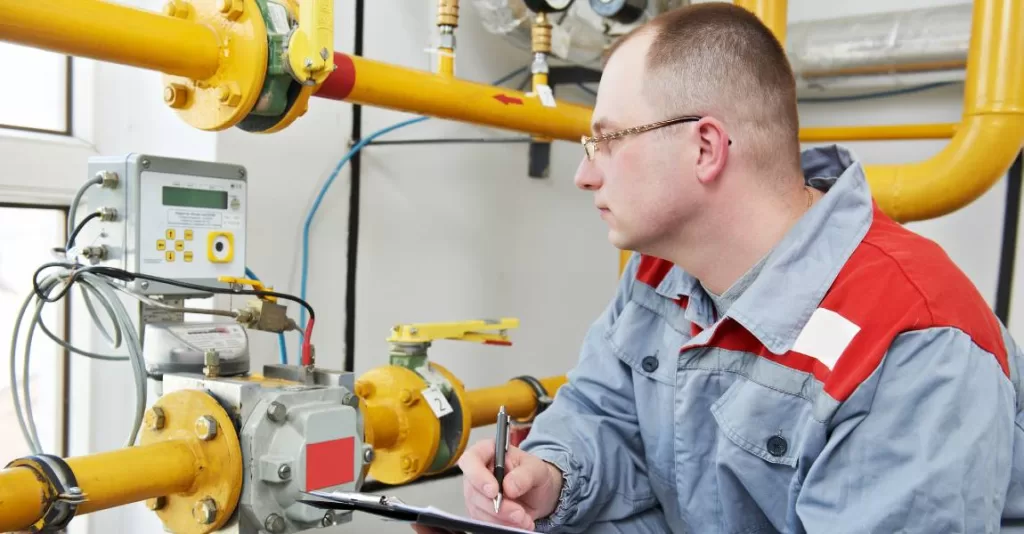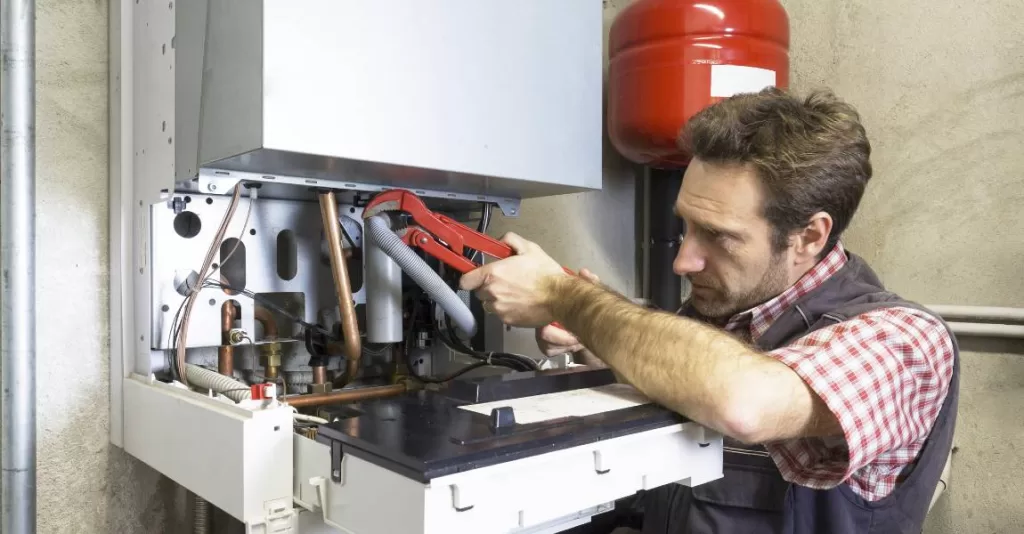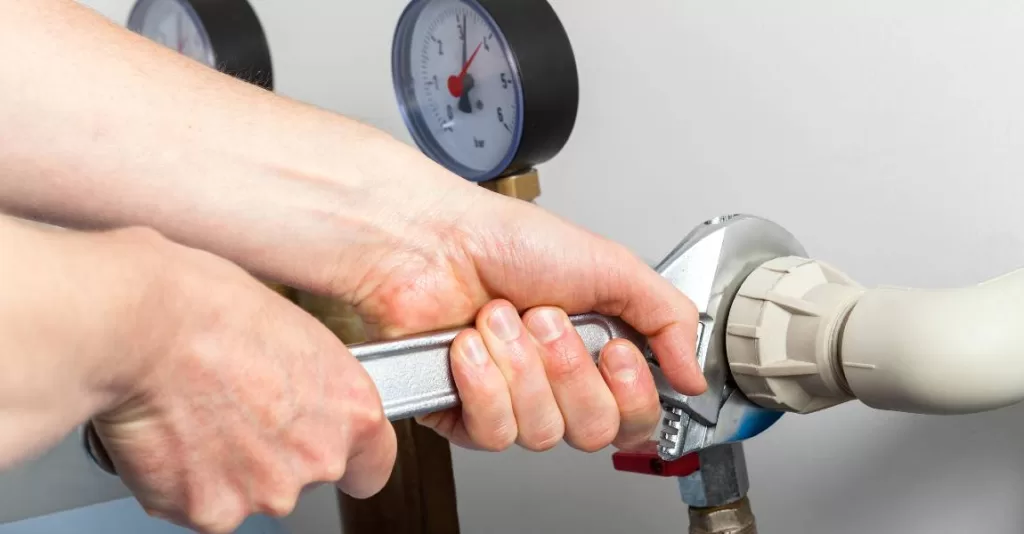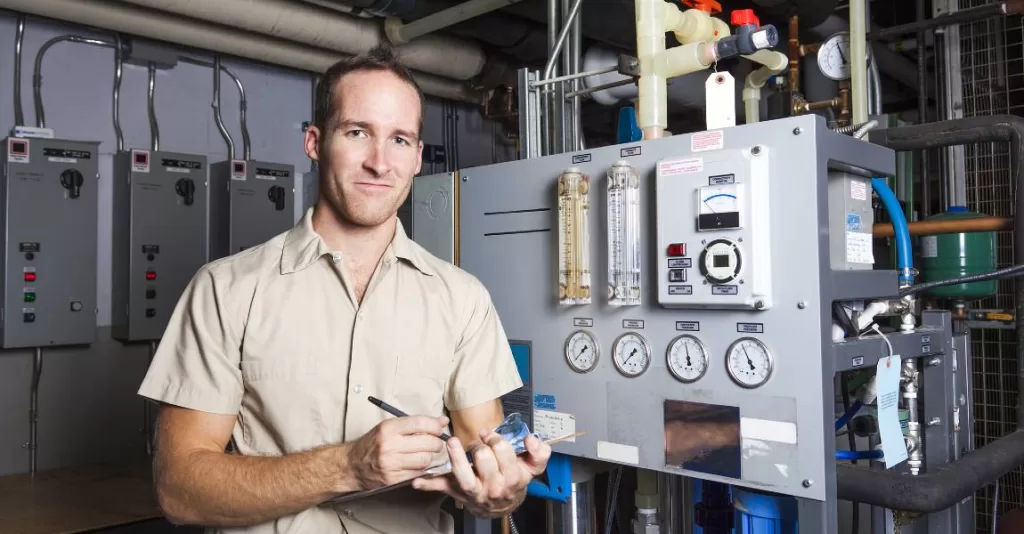A Guide to Boiler Repair 5 Essential Tips for Home Heating: Everything You Need to Know: When it comes to maintaining your home’s heating system, proper boiler repair is essential.
A malfunctioning boiler can not only leave you without heat, but it can also be dangerous. That’s why we’ve created this ultimate guide to boiler repair, where we will cover everything you need to know to keep your boiler running smoothly.

Table of Contents
What is a Boiler Repair?
A boiler repair refers to fixing any issues or malfunctions that may occur in a boiler system. A boiler is a type of heating system used to generate heat or hot water in a building or industrial setting.
Over time, boilers may develop problems such as:
- gas leaks
- air leaks
- faulty internal components
- reduced efficiency
Which affects their performance and functionality.
When a boiler needs repair, a trained professional technician, such as a heating engineer or qualified plumber, is called upon to assess the boiler issues and determine the necessary repairs. The repair process typically involves diagnosing the problem, identifying the faulty components or areas, and replacing or repairing them as needed.
Common boiler repairs may include fixing boiler leaks, replacing faulty valves or pumps, repairing or replacing malfunctioning thermostats or controls, addressing electrical issues, and cleaning or descaling the system to ensure its energy efficient.
Hiring a certified technician for your Boiler repairs ensures that the heating system operates safely and at peak efficiency.
Regular maintenance and prompt repairs can help prevent further damage or more costly repairs in the future. It is recommended to have a boiler annual inspection and serviced regularly to identify any potential issues before they escalate into major problems.
Ultimately, an expert boiler repair should restore the proper functioning of the boiler system, ensuring that it provides reliable heat or hot water for the building or facility it serves.

Guide on Types of Boilers
Several boiler types are available, each with advantages and uses. What are the 7 Different Types of Boilers?
Here are some of the main types:
- Gas Boilers
- Electric Boilers
- Oil-Fired Boilers
- Condensing Boilers
- Industrial Boilers
- Combi Boiler Repair
- Hot Water Boilers
Gas Boilers
These boilers use natural gas as fuel and are popular for their efficiency and lower operating costs. They are commonly used in residential and commercial settings.
Electric Boilers
These boilers use electricity as their power source and are often chosen for their simplicity and ease of installation. They are commonly used in areas where gas supply is limited or unavailable.
Oil-Fired Boilers
These boilers use oil as fuel and are commonly found in older homes or areas without access to natural gas. They are known for their reliability and ability to provide consistent heat.
Condensing Boilers
These boilers are designed to maximize energy efficiency by capturing and reusing heat that would otherwise be lost. They are highly energy efficient and can help reduce energy consumption and lower utility bills.
Industrial Boilers
These boilers are specifically designed for industrial applications and are used in large-scale operations such as manufacturing plants or power generation facilities. They are capable of handling high-pressure and high-temperature requirements.
Combi Boiler Repair
This refers to the repair or proper maintenance of combination boilers, which provide both central heating and hot water. Combi boilers are popular for their compact size and efficiency, but they may require occasional repairs or servicing to ensure optimal performance.

Common Problems with Boilers Requiring Repairs
Common problems with boilers requiring repairs can vary depending on the boiler model and age.
One of the most common issues is a broken boiler, resulting in a lack of hot water or heating.
Pilot light issues are common, where the pilot light may go out frequently or fail to ignite.
Leaking pipes or valves can cause water damage and decrease the boiler’s optimal performance.
Noises such as banging, clanging, or whistling can indicate internal problems that require attention.
Blocked air vents or flues can lead to inefficient combustion and potentially dangerous carbon monoxide buildup.
It is important to address these issues promptly to ensure the safe and efficient operation of the boiler.
Pro Tip: What are the Essential Boiler Maintenance Tips for Homeowners?
Winter season is Here is Your Boiler Ready? is a question that prompts homeowners to consider their boilers function in winter. One crucial aspect of ensuring warmth and efficiency is understanding the energy efficiency ratings for furnaces. Homeowners should compare these ratings to make informed choices about their heating systems. This will not only enhance comfort but also lead to significant savings on energy bills throughout the cold months.
It highlights the importance of ensuring that boilers are properly maintained and functioning efficiently to provide heat during the winter season. Don’t forget to prepare your home boiler system for winter weather.
Boiler Not Making Hot Water or Heating
When troubleshooting boiler repairs for no hot water or heating, follow these steps to our Guide to Boiler Repair: boiler efficiency troubleshooting tips can help identify issues that may not be immediately apparent. It’s essential to check for proper fuel supply and ensure that the combustion process is optimal. Additionally, regular maintenance can significantly enhance the overall efficiency and lifespan of your boiler system.
1. Check the thermostat: Make sure the thermostat is set to the desired temperature and is functioning properly. If it’s a programmable thermostat, ensure the schedule is correctly set.
2. Check the pressure gauge: The pressure gauge should read between 1 and 1.5 bar. If it’s below or above this range, adjust the pressure accordingly. Refer to the boiler’s manual for instructions on how to do this.
3. Reset the boiler: Some boilers have a reset button that can be pressed to restart the system. Locate the reset button and press it once. Wait for the boiler to start up again and see if the hot water or heating is restored.
4. Check the power supply: Ensure the boiler receives power. Check if the circuit breaker or fuse for the boiler has tripped or blown. If so, reset the breaker or replace the fuse.
5. Bleed the radiators: If air is trapped in the radiators, it can prevent hot water or heat from reaching them. Use a radiator key to bleed the radiators and release any trapped air. Start from the lowest radiator and work your way up.
6. Check the pilot light: If your boiler has a pilot light, ensure it is lit. If it’s not, follow the manufacturer’s instructions to relight it. If the pilot light keeps going out, there may be an issue with the thermocouple, and it may need to be replaced.
7. Inspect the boiler’s pressure relief valve: The pressure relief valve is a safety device that releases excess pressure from the boiler. If it’s constantly leaking, it may need to be replaced.
8. Check for frozen pipes: In colder climates, frozen pipes can cause a lack of hot water or heating. Inspect the pipes for any signs of freezing, such as frost or ice. If you find frozen pipes, thaw them using a hairdryer or warm towels. Take precautions to prevent pipes from freezing again, such as insulating them.
9. Call for professional assistance: If you have tried the above troubleshooting steps and still have no hot water or heating, it’s time to call a qualified heating engineer or emergency plumber. They will have the expertise to diagnose and repair any underlying issues with your boiler system.
Troubleshooting Pilot Light Issues on a Boiler
When troubleshooting boiler repairs for pilot light issues, follow these steps to our Guide to Boiler Repair:
1. Check if the pilot light is lit. If it is not, follow the next steps to troubleshoot the issue.
2. Make sure the gas supply to the boiler is turned on. Check the gas valve and ensure it is in the “on” position.
3. If the gas supply is on, but the pilot light still won’t ignite, check for any blockages in the pilot tube. Use a small brush or compressed air to clean out any debris or dirt that may be blocking the flow of gas.
4. If the pilot tube is clean and the gas supply is on, try relighting the pilot light. Follow the manufacturer’s instructions on how to do this, as it may vary depending on the boiler model.
5. If the pilot light still won’t ignite, it could be a faulty thermocouple. The thermocouple is a safety device that senses the heat from the pilot light and signals the gas valve to stay open. If the thermocouple is not working properly, it may need to be replaced.
6. Another possible issue could be a faulty gas valve. If the gas valve is not allowing gas to flow to the pilot light, it may need to be repaired or replaced by a professional.
7. If you have tried all the troubleshooting steps and the pilot light still won’t stay lit, contacting a qualified boiler technician or plumber is recommended to inspect and repair the boiler. They will have the necessary expertise and tools to diagnose and fix the issue.

Boiler Has Leaking Pipes or Valves
To troubleshoot boiler repairs for leaking pipes or valves, follow these steps to our Guide to Boiler Repair:
1. Identify the leak’s location: Inspect the boiler system and identify the area where the pipes or valves leak. This will help you figure out the necessary repair or replacement.
2. Shut off the water supply: Before attempting any repairs, turn off the water supply to the boiler. This will prevent further water leakage and ensure your safety during troubleshooting.
3. Check for loose connections: Inspect the pipes and valves for any loose connections. Tighten them using a wrench or appropriate tool if necessary. Sometimes, loose connections can cause leaks, and tightening them can resolve the issue.
4. Replace damaged or worn-out parts: If you notice any damaged or worn-out pipes or valves, they may need to be replaced. Remove the faulty components and install new ones. Use the correct size and type of pipes or valves for your boiler system.
5. Inspect and repair seals or gaskets: Leaks can also occur due to damaged or worn-out seals or gaskets. Inspect these components and replace them if necessary. Ensure proper alignment and tightness to prevent any future leaks.
6. Test for leaks: After making the necessary repairs or replacements, turn on the water supply and monitor the system for any signs of leakage. Check all the connections, joints, and components to ensure they are secure and leak-free.
7. Seek professional help if needed: If the troubleshooting steps above do not resolve the issue or if you are unsure about performing the repairs yourself, it is recommended to seek professional help. A qualified plumber or boiler technician can provide expert assistance and ensure the repairs are done correctly.
Remember, safety is paramount when troubleshooting boiler repairs. If you are unsure or uncomfortable with any step, consult a professional to avoid accidents or further damage to your boiler system.
Unusual Noises from the Boiler Unit
If you are experiencing unusual noises coming from your boiler, here are some steps to troubleshoot and potentially fix the issue:
1. Identify the type of noise: Different noises can indicate different problems with your boiler. Everyday noises include banging, whistling, gurgling, or rumbling. Understanding the type of noise can help pinpoint the underlying issue.
2. Check the water pressure: Low water pressure can lead to unusual noises in your boiler. Ensure the water pressure is at the recommended level, usually between 1 and 1.5 bar. If it is low, you may need to top up the system using the filling loop or consult a professional if unsure.
3. Bleed the radiators: Air trapped in the radiators can cause gurgling or banging noises. Bleeding the radiators will release any trapped air. Use a radiator key to open the bleed valve slightly until you hear a hissing sound. Once the water starts to come out, close the valve.
4. Check for leaks: Leaks in the boiler or heating system can cause unusual noises. Inspect the boiler and surrounding pipes for any signs of water leakage. If you find a leak, it is recommended to contact a qualified plumber to fix the issue.
5. Flush the system: Over time, sludge and debris can build up in the heating system, leading to strange noises. Flushing the system can remove this buildup. Consult a professional to perform a power flush or use a chemical cleaner if you have experience and knowledge in doing so.
6. Inspect the pump: A faulty or worn-out pump can cause odd noises. Check if the pump is running smoothly and not making any unusual sounds. If you suspect a problem with the pump, it is best to seek professional help for repair or replacement.
7. Call an experienced technician: If you have tried the above steps and the unusual noises persist, it is advisable to contact a qualified heating engineer or plumber. They will have the expertise to diagnose and resolve the issue safely.
Remember, boilers involve complex systems and should only be examined or repaired by trained professionals if you are unsure of what to do.
Boiler Has Blocked Air Vents or Flue
To troubleshoot boiler repairs for a blocked air vent or flue, follow these steps to our Guide to Boiler Repair:
1. Check for any visible blockages: Inspect the air vent or flue for debris, leaves, or other objects obstructing the airflow. Use a flashlight to get a clear view.
2. Clean the air vent or flue: If you find any blockages, carefully remove them using a brush or vacuum cleaner. Turn off the boiler and allow it to cool down before attempting to clean. In addition to cleaning the air vent, consider following these furnace maintenance tips for homeowners to ensure optimal performance. Regularly changing the air filter can prevent dust buildup and enhance airflow efficiency. It’s also wise to schedule a professional inspection annually to catch any potential issues early.
3. Check for signs of damage: Look for any signs of damage, such as cracks or holes in the air vent or flue. If you notice any, it may require professional repair or replacement.
4. Ensure proper ventilation: Check for any obstructions around the vent or flue outside your home, such as plants or debris. Clear away any obstacles that could impede the airflow.
5. Restart the boiler: After cleaning the air vent or flue and ensuring proper ventilation, restart the boiler and observe its operation. Pay attention to any unusual noises or smells that could indicate further issues.
6. Monitor the boiler: Keep an eye on the boiler for a few days to ensure it is functioning correctly and the air vent or flue remains clear. If you encounter any recurring issues or suspect a more significant problem, it is advisable to contact a professional boiler repair service for assistance.

Guide to Boiler Repair Maintenance Check
Regular annual boiler service ensures a well-maintained boiler that operates efficiently and safely. By scheduling regular annual services, homeowners can prevent potential breakdowns, extend the lifespan of their boiler, and save on costly repairs. A well-maintained boiler provides reliable heating and hot water and helps reduce energy consumption and lower utility bills.
During a boiler servicing, a qualified technician will thoroughly inspect the boiler, checking for any signs of wear and tear, leaks, or malfunctions. They will also clean and lubricate components, test safety controls, and ensure proper combustion. Regular inspections allow technicians to identify and address any issues before they become significant problems, minimizing the risk of unexpected breakdowns and ensuring that the boiler operates at peak performance.
It is recommended to have a yearly maintenance service for boilers, as this ensures that the system is thoroughly checked and serviced regularly. This annual maintenance helps maintain the boiler’s efficiency and reliability while ensuring compliance with safety regulations. By investing in regular boiler maintenance, homeowners can have peace of mind knowing that their boiler is well-maintained, efficient, and safe.
How Much Does Boiler Maintenance Cost?
Boiler maintenance costs can vary depending on several factors, such as the type of boiler, its age, and the extent of repairs needed. Repairs can range from minor repairs to major replacements, and it is crucial to address any issues promptly to avoid potential damage and costly repairs in the long run.
On average, homeowners can expect to pay between $200 and $300 for a standard boiler maintenance visit.
Regular maintenance of a boiler is essential not only for its longevity but also for energy efficiency. A well-maintained boiler operates more efficiently, resulting in lower energy bills. Neglecting boiler maintenance can lead to increased energy usage and higher heating bills. It is a daunting task for homeowners to keep up with boiler maintenance, but investing in regular check-ups and servicing can save money in the long term.
Upgrading to a high-efficiency boiler is another way to reduce energy consumption and lower heating bills. These boilers are designed to maximize energy efficiency and provide a comfortable temperature in the home while minimizing energy wastage. By investing in a high-efficiency boiler and properly maintaining it, homeowners can enjoy cost savings on their energy bills while ensuring a comfortable living environment.
While boiler maintenance may seem like a daunting task, it is essential for both the longevity of the boiler and the overall comfort of the home. By regularly servicing the boiler and addressing any repair needs promptly, homeowners can ensure optimal performance, minimize energy usage, and ultimately save on energy bills.

What to Look for When Hiring a Boiler Repair Technician | FAQ’s
Pro Tip: How to Find a Reliable Boiler Repair Service
How long have you been repairing boilers?
This question helps determine the technician’s level of experience and expertise in boiler repair.
Are you licensed and insured?
It is essential to hire a licensed and insured technician to ensure they meet the necessary qualifications and can provide coverage in case of any damages or accidents during the repair process.
Can you provide references or testimonials from previous boiler repair clients?
Asking for references or testimonials allows you to gauge the technician’s reputation and the quality of their work.
What is your approach to diagnosing boiler issues?
Understanding the technician’s diagnostic process can give you insight into their problem-solving skills and ability to identify and fix boiler problems efficiently.
What types of boiler repairs do you specialize in?
This question helps determine if the technician has specific expertise in the type of boiler repair you require, such as gas boilers, oil boilers, or electric boilers.
Can you provide a detailed estimate for the repair?
It is essential to understand the cost involved in the repair, including any parts and labor charges, to avoid any surprises regarding payment.
Do you offer any warranty or guarantee on your repair work?
Inquiring about warranties or guarantees helps ensure that the technician stands behind their work and provides reassurance in case any issues arise after the repair.
How long will the repair take?
Knowing the estimated timeline for the repair allows you to plan accordingly and make arrangements if necessary.
Can you provide preventive maintenance tips or recommendations to avoid future boiler issues?
A knowledgeable technician should be able to advise on properly maintaining your boiler to prevent future problems and prolong its lifespan.
What is your availability for emergency repairs?
It is essential to know if the technician offers emergency repair services, especially if you are facing a boiler issue that needs immediate attention.
Boiler Repair Conclusion
In conclusion, the Ultimate Guide to Boiler Repair provides valuable information and insights for homeowners and businesses alike. Whether you are experiencing a boiler issue or simply looking to maintain your system, this guide offers comprehensive guidance on troubleshooting, maintenance, and finding professional help. When it comes to fixing issues or ensuring optimal performance, it’s important to seek out reliable boiler repair in your area. Locating skilled technicians can make a significant difference in the longevity and efficiency of your system. Investing in professional services not only saves time but also ensures safety and compliance with local regulations.
To ensure that your boiler repair needs are handled by experienced professionals, JD’s Plumbing Heating and Air Conditioning is here to assist you. With our team of skilled technicians and years of industry expertise, we are committed to providing top-notch service and ensuring the optimal functioning of your boiler system.
Don’t let a malfunctioning boiler disrupt your comfort and safety. Contact us today for reliable and efficient boiler repair services. Let us handle your boiler needs and keep your home or business running smoothly.


